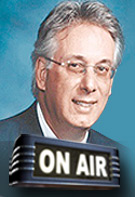
 As you read this the National Association of Broadcasters/Radio Advertising Bureau meeting in Dallas is wrapping up. I am writing this before the conference starts. You should search the “Gore-net” to get information about panels and news that comes out of the meeting.
As you read this the National Association of Broadcasters/Radio Advertising Bureau meeting in Dallas is wrapping up. I am writing this before the conference starts. You should search the “Gore-net” to get information about panels and news that comes out of the meeting.
There is usually something earth-shattering that happens. Companies get sold, managers change positions and policies are set for the upcoming year.
One of the pressing issues this year is sure to be the online portion of the broadcast business. Just this week CCME head honcho Robert Pittman pushed for more cooperation between the radio broadcast business and the record companies.
Mr. Pittman is the leader in both partnering with record companies and moving assets to online so he has a vested interest in seeing others come aboard.
I have said in the space many times that I consider Mr. Pittman an unequaled visionary in this area. I just wish I could see what he sees. Remember that he once ran Century 21 so I suspect that he is living by the mantra of location, location, location.
He appears to be collecting all of the real estate online.
A couple of other pieces of information came out this week that can impact broadcaster’s plans. The best news is that, despite all of the competition from Pandora, Spotify and the like, radio is still used each week by 93% of all Americans. Those numbers have not moved up or down for many years now and those of us who make a living in radio are out there searching for that 7%.
The other good news, and something that Mr. Pittman saw early on, is that the online services that are growing are the ones with unique content. IHeartRadio has the best of both worlds. You can build your own “personalized” radio or go to any of the hundreds of radio stations available through the service. The hundreds of online stations offer, by its nature, unique content.
A record company head admitted to me that the record business model is broken (not news to anyone) and that radio is looked at as the salvation. Not getting music played on the radio, but collecting fees and taxes from broadcasters.
The problem is something Mr. Pittman knows. There is little money there. Why would anyone believe that radio is the only business that has not been impacted by the economic downturn? Believe me there is not enough money for radio to float records.
I would think that the finding the most vehicles for getting your product out to the public should be the goal. Giving broadcasters pause over whether they should be streaming doesn’t seem to be the right plan.
Whatever. People much smarter than me are going to figure this out and hopefully everyone will make some money. That is my only concern. I know firsthand.
I own a couple of businesses and one of them is not making any money. In fact it is losing money every month. I really don’t like getting that statement from Bank of America.
I don’t know one radio company making enough money online to support another industry.
I don’t know the particulars of the deal that Mr. Pittman cut with BMLG President Scott Borchetta but these partnerships will always be a good idea if it creates commerce.
Mr. Borchetta gets the vehicle to expose his product and Mr. Pittman gets a head start with important product. Clear Channel stations heartily supported Taylor Swift’s single, “We Are Never Ever Getting Back Together.” It is tough to tell how much impact this had on Ms. Swift’s single. Ms. Swift can sell huge numbers of downloads singing the Nashville phone book. Her following is loyal and deservedly so. She has delivered more than Octomom over the last 5 years.
This is the kind of relationship that works for both records and broadcasters. Not one that either side feels pinched to participate in.
(The views expressed in this article are those of the author and do not necessarily reflect those of MusicRow.)



